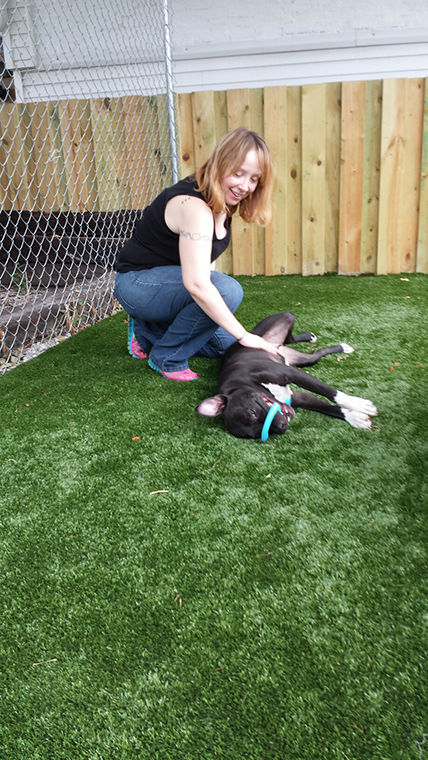Notable Native: Carolyn Alonzo
In her time at the CCPC, Carolyn Alonzo has volunteered at three events and works at the spay and nueter table.
February 19, 2018
Pets may be friendly companions to some or nuisances to others, but for Carolyn Alonzo, furry friends are an integral part of life.
When she’s not with her Beagles, Pete and Obi, Alonzo, 41, can be found caring for other’s hounds at her company, Fetch Pet Care. Or perhaps shes at One Tail at a Time, a no-kill, all-breed rescue center—2144 N. Wood St.—or volunteering at the Chicago Community Pets Coalition, a partnership by OTAT and ALIVE Rescue to keep animals with their families.
The Chronicle spoke with Alonzo about her time at the CCPC and passion to help pets and owners.
THE CHRONICLE: In what ways do you give back to the pet community?
CAROLYN ALONZO: Fetch Pet Care has been in business for 11 years, and along with providing dog-walking services, we provide overnight dog sitting. This service is a great way to help dogs that may not be able to be boarded at a kennel for a variety of reasons. It not only reduces stress on the dog, but it keeps the owner happy too. I’m also a partner with and associate board member of OTAT. Otherwise, I spend my time volunteering and helping with community events at the CCPC. So far I’ve been a part of three or four events. I’m trying to help out any way I can.
What happens at the CCPC community events?
The CCPC will go into communities in need to help provide direct care for as many animals as possible at a reduced fee or at times for free. We will provide free vaccinations on the spot, such as rabies, help schedule spay and neuter appointments for pet owners, provide tracking chips for dogs and will even help people obtain proper dog collars. At times, pets have been brought in on chains or rope because people don’t have access to leashes and harnesses. These residents may not have access to quality veterinary care or basic needs such as proper leashes.
When people come to these events, we provide them with a wide array of services so when they leave, they have everything they need. We even provide food for the pets at the location. I spend my time at the spay and neuter table.
What is it like at the spay and neuter table?
It can be challenging at times. When people come to the events, they know they are getting the vaccinations that they need, new leashes, chips for their pets or any other service we [provide]. They don’t need to be convinced. Most people are excited about it because they want to get their pets spayed and neutered. People may have fears … about the treatment that may not be true. We walk them through the benefits and provide something to read to help ease their decision making.
It can be rewarding, especially knowing the benefits of spaying and neutering. Getting them to sign up and show up for the appointment is really rewarding.
What would happen if they weren’t spayed or neutered?
There would be additional work for families which could lead to problems. Female dogs will get their period which could provide extra hassle, and male dogs might be more aggressive and tend to roam around more. There are many reasons to do it and few not to.
My first rescue dog wasn’t fixed when I got him. We didn’t fix him right away, so there was problem after problem after problem. He was getting aggressive with our other dogs, unpredictable and scary. Anytime the doorbell rang, whether we were expecting people or ordered takeout, we had to be on high alert. When the doorbell rang, he was more aggressive. He would go after other dogs, and I was [once] bitten after trying to separate the two. Before he was neutered, we were constantly in a state of fear and stress. We even removed the doorbell because we couldn’t deal with him. He was a beagle. Most people don’t think about those traits when you think about a beagle.
After he was neutered, it was completely night and day with him. He was still the cuddly dog we grew to love but more predictable and calm. He’s 14, and I don’t know if he would have lived that long unless he was neutered. He was a healthier and happier dog.
By spaying these animals, it may be easier to care for, making families more likely to keep the dog. If these families have kids, they might not keep an overly aggressive dog, and these animals could be separated from their loved ones.
Why are pets important to families?
Pets are part of the family to most people. There’s a million benefits to having a dog in your house. They are great with kids, they can help kids get exercise and you provide enrichment for them as well. Beyond that, pets teach kids valuable lessons because they are taking care of someone.
When you treat your pet like family, it can leave a hole in the family and create a sense of loss if they were to go away.
Do you feel like you are making a difference in these people’s lives?
I truly believe I am making a difference. It makes you feel so good to be able to help people who may not have access to vet care or basic needs like a collar or leash. You walk away feeling like you’ve helped people, and it’s a great way to spend your day.








